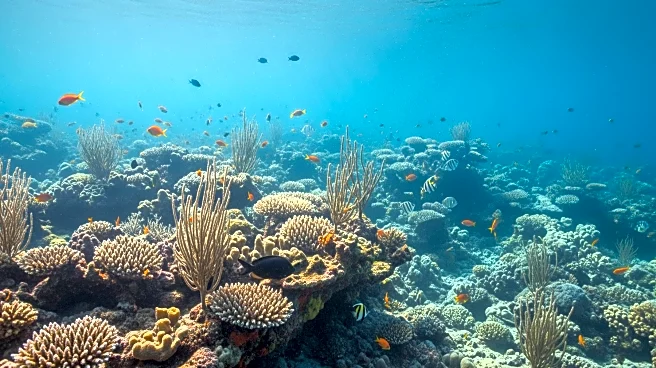What's Happening?
A study conducted by the University of Hawai'i at Mānoa has provided direct evidence that waste from deep-sea mining operations could disrupt vital ecosystems in the Pacific Ocean's Clarion-Clipperton Zone (CCZ). This biologically rich region is targeted
for the extraction of polymetallic nodules containing minerals essential for electric vehicles and renewable technologies. The research, published in Nature Communications, found that sediment discharged during mining operations could harm marine life in the midwater 'twilight zone,' a habitat supporting vast populations of zooplankton, which are crucial to the ocean's food web. The study determined that 53% of zooplankton and 60% of micronekton, which feed on zooplankton, would be affected by mining waste discharge, potentially impacting larger predators such as fish, seabirds, and marine mammals.
Why It's Important?
The findings highlight the potential for deep-sea mining to trigger widespread and long-lasting changes in ocean ecosystems. The disruption of the food web could extend to commercial fisheries, affecting seafood consumed globally. The study underscores a regulatory gap, as no international rules currently govern the discharge of mining waste. The twilight zone, teeming with life, plays a crucial role in maintaining the planet's carbon balance and supporting marine ecosystems. The research calls for responsible regulation to protect these ecosystems, emphasizing the need for international rules to safeguard marine life from surface waters to the deep sea.
What's Next?
The study's authors hope their findings will guide policy discussions at the International Seabed Authority and inform environmental reviews by the National Oceanic and Atmospheric Administration. They stress the importance of developing international rules to protect marine ecosystems before commercial deep-sea mining begins. The research suggests that careful consideration of the depth at which mining waste is discharged is essential to prevent harm to ocean communities.
Beyond the Headlines
The study raises ethical and environmental concerns about the impact of industrial activities on ocean ecosystems. It highlights the need for a balance between resource extraction and environmental conservation, urging stakeholders to consider the long-term implications of deep-sea mining on marine biodiversity and global food security.

















